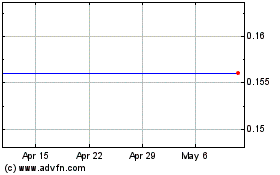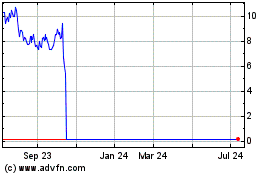VBL Therapeutics Presents New Data Supporting Use of Lecinoxoids in NASH
April 03 2017 - 7:00AM

Phase 2 Study of VB-201 Shows Reduction in Liver
Enzymes
VBL Therapeutics (Nasdaq:VBLT), announced today that in a post-hoc,
hypothesis-driven analysis of data from completed Phase 2 studies,
VB-201 appears to reduce certain liver enzymes. The
data will be presented today at the H.C. Wainwright 1st Annual NASH
Investor Conference, at the St. Regis Hotel in New York City.
| |
|
|
|
Presentation Details @ H.C. Wainwright NASH Investor
Conference |
| |
|
|
| Date: |
|
Monday, April
3 |
| Time: |
|
8:20am Eastern
Time |
| Presentation Room: |
|
Versailles
Room |
| Webcast: |
|
http://wsw.com/webcast/hcw/vbl |
| |
|
|
The analysis was conducted following the effect seen with VB-201
in pre-clinical models for non-alcoholic steatohepatitis (NASH) and
renal fibrosis, in which VB-201 and VB-703, a next-generation
Lecinoxoid drug candidate, reduced inflammation and fibrosis
without affecting the lipid profile or steatosis.
VBL has studied VB-201 in five Phase 1 studies and three Phase 2
studies, some of which included patient populations known to have
high rates of metabolic syndrome (e.g. psoriasis). In a
retrospective analysis of liver enzyme tests performed for subjects
dosed with VB-201, the Company identified a statistically
significant time- and dose- dependent reduction of alkaline
phosphatase (ALP) blood levels in patients treated orally with
VB-201, which was reversed during a 4-week follow-up period after
the patients completed the study. A similar but milder reduction
was seen with levels of gamma-glutamyltransferase (GGT), an
additional enzyme induced in liver damage. In the NASH setting, ALP
and GGT may serve as biomarkers and lowering of ALP and GGT levels
may indicate improvement in liver fibrosis. The decrease in ALP and
GGT levels is in correlation with the Lecinoxoids
anti-inflammatory/anti-fibrotic mechanism of action.
About VBL's Lecinoxoid Platform: VBL
Therapeutics has developed the Lecinoxoids, a novel class of
orally-available anti-inflammatory small molecules. Lecinoxoids
mimic the structure of native phospholipid molecules that regulate
the inflammatory process in vivo; however, Lecinoxoids are
synthesized chemically in a manner that increases their stability
and ability to target specific receptors. Lecinoxoids act through
two specific mechanisms: (1) The inhibition of the Toll-like
receptor (TLR) signaling by the TLR2 and CD14/TLR4 complexes –
inflammatory pathways implicated in various inflammatory diseases;
and (2) the inhibition of the migration of monocytes toward
chemo-attractants present in areas of inflammation. By modulating
innate immunity, the controller of the immune system, Lecinoxoids
can potentially target a spectrum of immune-inflammatory diseases
including cardiovascular diseases, NASH/Liver fibrosis, renal
fibrosis and others. The lead drug from the Lecinoxoids platform,
VB-201, is an oral small molecule that has been administered to
more than 600 patients, across eight trials and was observed to be
relatively safe. In an exploratory Phase 2 trial, using a PET CT
VB-201 has demonstrated significant reduction of atherosclerosis
vascular inflammation, meeting the primary endpoint of the
sub-study. VB-201 did not meet the primary endpoint in Phase 2
clinical trials for psoriasis and for ulcerative colitis, however
it is Phase-2-ready and can be employed directly in clinical
trials. Beyond VB-201, VBL has developed 2nd and 3rd generation
structurally-related chemical compounds, which we believe offer
greater pharmacological efficacy, higher mechanistic selectivity
and longer patent term relative to VB-201. We have observed
promising preclinical results in NASH and renal fibrosis models in
some molecules, such as VB-201 and VB-703.
About VBL Vascular Biogenics Ltd.,
operating as VBL Therapeutics, is a clinical stage
biopharmaceutical company focused on the discovery, development and
commercialization of first-in-class treatments for cancer. The
Company’s lead oncology product candidate, ofranergene obadenovec
(VB-111), is a first-in-class, targeted anti-cancer gene-therapy
agent that is positioned to treat a wide range of solid tumors. It
is conveniently administered as an IV infusion once every two
months. It has been observed to be well-tolerated in >200 cancer
patients and we have observed its efficacy signals in an “all
comers” Phase 1 trial as well as in three tumor-specific Phase 2
studies. Ofranergene obadenovec is currently being studied in a
Phase 3 pivotal trial for recurrent Glioblastoma, conducted under
an FDA Special Protocol Assessment (SPA).
Forward Looking Statements: This press release
contains forward-looking statements. All statements other than
statements of historical fact are forward-looking statements, which
are often indicated by terms such as “anticipate,” “believe,”
“could,” “estimate,” “expect,” “goal,” “intend,” “look forward to”,
“may,” “plan,” “potential,” “predict,” “project,” “should,” “will,”
“would” and similar expressions. These forward-looking statements
include, but are not limited to, statements regarding the clinical
development of VB-111 and its therapeutic potential and clinical
results, including statements related to the Phase 3 pivotal trial
for rGBM, and statements regarding our Lecinoxoids platform and its
therapeutic potential and clinical results ,including those related
to VB-201, VB-703 and certain second and third generation
Lecinoxoid compounds. These forward-looking statements are not
promises or guarantees and involve substantial risks and
uncertainties. Among the factors that could cause actual results to
differ materially from those described or projected herein include
uncertainties associated generally with research and development,
clinical trials and related regulatory reviews and approvals, and
the risk that historical clinical trial results may not be
predictive of future trial results. A further list and description
of these risks, uncertainties and other risks can be found in the
Company's regulatory filings with the U.S. Securities and
Exchange Commission. Existing and prospective investors are
cautioned not to place undue reliance on these forward-looking
statements, which speak only as of the date hereof. VBL
Therapeutics undertakes no obligation to update or revise the
information contained in this press release, whether as a result of
new information, future events or circumstances or otherwise.
INVESTOR CONTACT:
Michael Rice
LifeSci Advisors, LLC
(646) 597-6979
Vascular Biogenics (NASDAQ:VBLT)
Historical Stock Chart
From Mar 2024 to Apr 2024

Vascular Biogenics (NASDAQ:VBLT)
Historical Stock Chart
From Apr 2023 to Apr 2024
